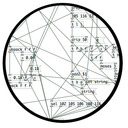You can use this code with [comport] and an abstraction I made, [serial_print] (if you're on extended then use [serial_print_extended]), which you can get from my GitHub https://github.com/alexdrymonitis/Arduino_Pd
The only modification you'll need to do is to replace some white spaces. In the loop() function, the code reads:
Serial.print("pin ");
Serial.print(i);
Serial.println(" was touched");
change the last line with:
Serial.println(" was_touched");
Do the same for further down where it reads:
Serial.print("pad ");
Serial.print(i);
Serial.println(" was_touched");
and close to the end where it reads:
Serial.println(" was_released");
In [serial_print] the white space is read as a separator (it can be used in a string, but with this code it's not really functional).
Lastly, int the setup() function there's a line that reads:
Serial.print("begin to init");
put two forward slashes at the beginning of the line (//) to comment it out, as this string is not very helpful in Pd. If you really need it, you'll need to modify it.
In Pd, do the following:
[comport 1 9600] <- the 1st argument is the port number and the 2nd the baud rate (the 1st might be different in your computer)
|
[serial_print]
| /
[send]
[r pin]
|
[print]
[r pad]
|
[print]
You'll receive data using the strings "pin" and "pad" in [receive]s. Use print to see the data that comes out and use that data as you wish.
Read [serial_print]'s help patch to see how it works.



 I keep getting
I keep getting